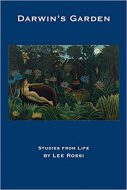 Lee Rossi
Lee Rossi
Darwin’s Garden: Studies from Life
Moon Tide Press
Reviewer: Ann Wehrman
In Darwin’s Garden, the formidable poet Lee Rossi reflects upon life in 21st century America, as well as his own past decades growing up, through the lens of “a middle-class Catholic boy from the suburbs of St Louis…[t]wo generations away from Italy, six from Ireland and France…simply American, white as Wonder Bread, bland as apple sauce.” The poems in this 2019 collection are anything but bland, though. Rossi ponders and reminisces, exploring life, studying the intricacies of myriad experiences, including abuse, pain, and disappointment, often via memories of romantic relationships and childhood experiences.
Rossi’s insight and deft use of language probe perceived hypocrisy and shortcomings, both within society and himself. Yet Rossi’s often lyrical, narrative style retains a pastoral balance and geniality; even when he rages, his way is not to hack and tear at the offending world but to internalize the battle, reflecting on love, values, and actions as illuminated, however imperfectly, by the bonfire raging all around him. As a rule, here, the speaker seems to be searching to find himself and suffering—almost seeking suffering—in order to better understand life and himself through feeling and experience.
In “Pastures,” Rossi writes,
…Last week, someone in our church
lost her son,
twenty-one and with a history
of drugs and alcohol. His girlfriend found him
in bed, unconscious.
He never woke up. Was it drugs? Alcohol?
Nobody will say. All they’ll say is what a bright
spirit he was,
how creative, filled with life.
And now it’s gone, nobody’s fault. At least.
nobody’s
taking the blame.
Many of the poems allude to the poet’s father, a powerful presence in his emotions and mind; Rossi characterizes that strong, flawed man in “To the Blackout of ’69, Ithaca, New York”:
I have kept silent for years,
amazed at my talent for suffering,
the way a tree will go on feeding the insects
which cause its death. And I have been the insect,
feeding on love until it too was dead.
. . .
I thought of his boxing, all the years of his adolescence,
the fact that he won
because he was willing to suffer more than the other guy.
Rossi writes here of nuns in school, of guilt and sin, and of rebellion against old ways, despite still clinging to them internally through habitual patterns of abuse, pain, and guilt. In “Straight Edge” the writing is imaginative yet dark, searching for redemption through imagery:
I am the traitor who leaves the gate
unlatched, the emptiness of history,
the vacuum of time pouring in
like the Great Flood, four thousand and
four years before this new era, the one
that leads inevitably to this moment.
Is he a traitor to Catholicism, to humanity, or to himself? Is facing that a final statement, or a beginning?
The collection is not all somber; Rossi often writes with gentle humor, as in “Confessions of a Lapsed Gym Rat,” which paints a sly portrait of workout culture, touching on issues of (perhaps excessive) care for oneself:
We were beautiful
in our spandex and sweat-stained lycra,
hair pulled back or caught in bands
of terry cloth, eyes bright with exertion,
muscles taut and gleaming. It was a dance
whose only goal was the glow
which surrounded us
in the locker room and on the drive to work.
Cast us in bronze, carve us in marble,
we were that close to ideal.
And still we never stopped,
knowing that if we ever renounced
our zeal, if ever we fell
from perfection’s path
and strayed into love’s byways,
into preschools and maternity wards,
we’d be shut from those bright Edenic doors,
musclebound angels standing guard,
condemned to pass the display windows,
others now striding purposefully toward the unattainable,
while we trudged by,
exhausted and pudgy and faithful to something less
elusive, something other than ourselves.
Rossi strips away the false glamour of the fitness devotee, exposing the puffy egoism that too often accompanies habitual exercise and other self-improvement regimens. Where is the balance, the natural unself-conscious relationship of one’s body and self with others and the universe? Of course, that remains an ideal more than a way of life for most people in this world.
In addition to humor, some poems here reveal Rossi’s inner romantic. Perfect imagery in the beautiful idyll, “Seahorse in Saw Grass,” paints a metaphorical portrait of conjugal love:
it’s not his fault he’s a lousy swimmer
and must cling to a stalk
or mangrove tangle
does she remember his struggles
with other males
head thrust and tug of war
or that first dance
when she gripped
the same strand of grass
with her tail and they wheeled
in unison as overhead
the water brightened
. . .
and does he remember when
from dawn to dusk
they let go of every anchor
drifted upward
snout to snout
spiraling as they rose
The poet shines a tender, rose-filtered light on the seahorse pair, revealing the inner idealist who testifies to love even while knee-deep in the mud of this world.
In Darwin’s Garden, Rossi’s rich diction and metaphor flow abundantly, sensuously. Overall, this collection’s voice rings sadly, bordering on resignation, having sought redemption for the wrongs he sees outside himself and within, but so far, to no avail. In “Lip Service,” he writes, “Nothing’s better than that last puff when / the nicotine is densest and you can almost feel / the glowing tip sear your lungs, / holding it in as you crush the butt / into a grimy paste and head back into the bar.” Nevertheless, the poet’s strong life force and fidelity to truth and love also sing here, and one feels that perhaps Rossi will in time reach his longed-for Grail, deep within.

